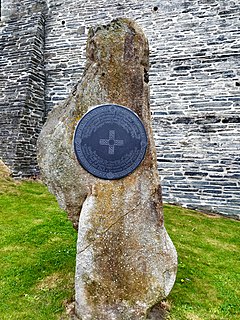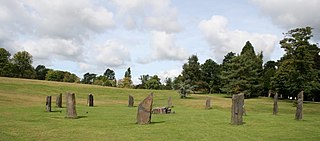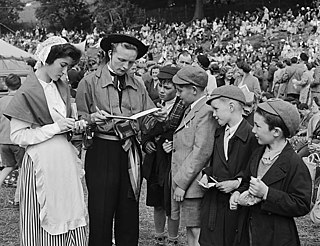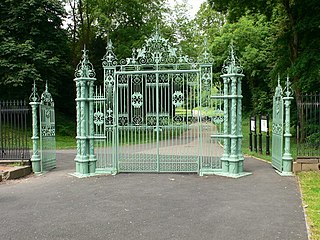 W
WIn Welsh culture, an eisteddfod is a festival with several ranked competitions, including in poetry and music. The term eisteddfod, which is formed from two Welsh morphemes: eistedd, meaning 'sit', and fod, meaning 'be', means, according to Hywel Teifi Edwards, "sitting-together." Edwards further defines the earliest form of the eisteddfod as a competitive meeting between bards and minstrels, in which the winner was chosen by a noble or royal patron.
 W
WThe 1176 Cardigan eisteddfod, as it is commonly described, was a cultural tournament involving bards and musicians, held in the grounds of Cardigan Castle, Cardigan, West Wales, by the Lord Rhys ap Gruffydd. Though the term 'Eisteddfodd' was not commonly used until several centuries later, the 1176 gathering is commonly claimed to be the earliest recorded forerunner of the modern national eisteddfod event.
 W
WThe 2018 Cardiff National Eisteddfod was held in Cardiff Bay, Wales, from 3 to 11 August 2018. It was the seventh time the National Eisteddfod of Wales had been held in Cardiff. The 2018 event was billed as the Eisteddfod with "No fences" because it dispensed with the traditional enclosed 'Maes', or entrance fees to the event location. It made a £290,000 loss, but its popularity led to the suggestion of future Eisteddfods without fences.
 W
WArchdruid is the title used by the presiding official of the Gorsedd. The Archdruid presides over the most important ceremonies at the National Eisteddfod of Wales including the Crowning of the Bard, the award of the Prose Medal and the Chairing of the Bard. Although Iolo Morganwg was the first to preside over the Gorsedd when the National Eisteddfod came into being, his successor David Griffith, under the bardic name "Clwydfardd", was the first to be known by the official title "Archdruid".
 W
WIn Celtic cultures, a bard is a professional story teller, verse-maker, music composer, oral historian and genealogist, employed by a patron to commemorate one or more of the patron's ancestors and to praise the patron's own activities.
 W
WThe Chairing of the Bard is one of the most important events in the Welsh eisteddfod tradition. The most famous chairing ceremony takes place at the National Eisteddfod of Wales, and is always on the Friday afternoon of Eisteddfod week. Winners are referred to as Y Prifardd. The custom of chairing the bard is, however, much older than the modern eisteddfod ceremony, and is known to have taken place as early as 1176.
 W
WJohn Cadvan Davies (1846–1923) was a Wesleyan Methodist Minister and a Welsh poet, who served as Archdruid. He is better known in Wales by his bardic name, Cadfan.
 W
WA gorsedd is a community or meeting of modern-day bards. The word is of Welsh origin, meaning "throne". It is often spelled gorsedh in Cornwall and goursez in Brittany, reflecting the spellings in the Cornish and Breton languages, respectively.
 W
WGorsedd Cymru, or simply the Gorsedd or the Orsedd, is a society of Welsh-language poets, writers, musicians and others who have contributed to the Welsh language and to public life in Wales. Its aim is to honour such individuals and help develop and promote their fields in addition to maintaining relationships with other Celtic nations and Y Wladfa. The Gorsedd is most prominent at the National Eisteddfod of Wales where it is responsible for the main ceremonies held.
 W
WGorsedd Stones are groups of standing stones constructed for the National Eisteddfod of Wales. They form an integral part of the druidic Gorsedd ceremonies of the Eisteddfod. The stones can be found as commemorative structures throughout Wales and are the hallmark of the National Eisteddfod having visited a community.
 W
WWalter Davies, commonly known by his bardic name Gwallter Mechain, was a Welsh poet, editor, translator, antiquary and Anglican clergyman.
 W
WHowell Elvet Lewis, widely known by his bardic name Elfed, was a Welsh Congregational minister, hymn-writer, and devotional poet, who served as Archdruid of the National Eisteddfod of Wales from 1924 to 1928.
 W
WThe Llangollen International Musical Eisteddfod is a music festival which takes place every year during the second week of July in Llangollen, North Wales. It is one of several large annual Eisteddfodau in Wales. Singers and dancers from around the world are invited to take part in over 20 competitions followed each evening by concerts on the main stage. Over five thousand singers, dancers and instrumentalists from around 50 countries perform to audiences of more than 50,000 over the 6 days of the event.
 W
WMaes is the name commonly given to the site of a Welsh eisteddfod, such as the National Eisteddfod or the Urdd Eisteddfod. All the main events and event venues are located on the Maes.
 W
WThe National Eisteddfod of Wales is the most important of several eisteddfodau that are held annually, mostly in Wales. Its eight days of competitions and performances are considered the largest music and poetry festival in Europe. Competitors typically number 6,000 or more, and overall attendance generally exceeds 150,000 visitors. The 2018 Eisteddfod was held in Cardiff Bay with a fence-free 'Maes'. In 2020 the event was held virtually under the name AmGen; events were held over a one-week period.
 W
WPontypool Park is a 150-acre (0.61 km2) park in Pontypool, Torfaen, Wales. The park was formerly the grounds of Pontypool House and was laid out in the closing years of the 17th century for John Hanbury, an ironmaster, who is closely associated with Japanware. The grounds were purchased by the local authority in 1920, while the estate house was leased, and later sold, to the Sisters of the Holy Ghost to become St. Alban's RC High School. The former stables now house the Torfaen Museum. The grounds contain a number of structures including a double ice house, the Folly Tower and the Shell Grotto. The park is entered through the Pontymoile Gates. The gates, the grotto and the stables are all Grade II* listed structures, while the former hall and the ice house are listed Grade II.
 W
WThe Urdd National Eisteddfod is an annual Welsh-language youth festival of literature, music and performing arts organised by Urdd Gobaith Cymru. Arguably Europe's largest youth festival, it is usually held during the last week of May, coinciding with schools' half term holiday. Locations alternate between north and south Wales. The Eisteddfod consists of competitive singing, recitation, art, composition, dance and instrumental events for contestants aged between 7 and 24 years. Regional qualifying heats are held in advance around Wales.
 W
WY Lle Celf is an annual art, craft and architecture exhibition held during the National Eisteddfod of Wales, claimed to be the biggest temporary art exhibition in Europe.